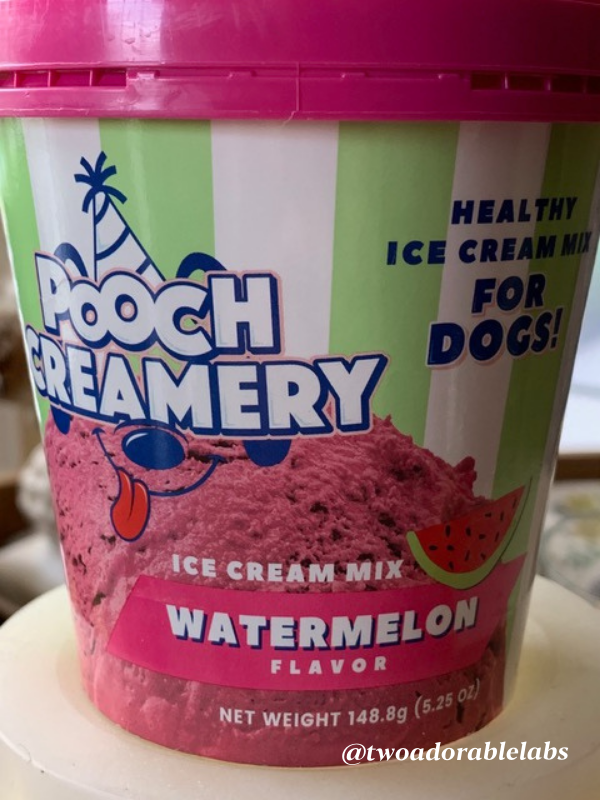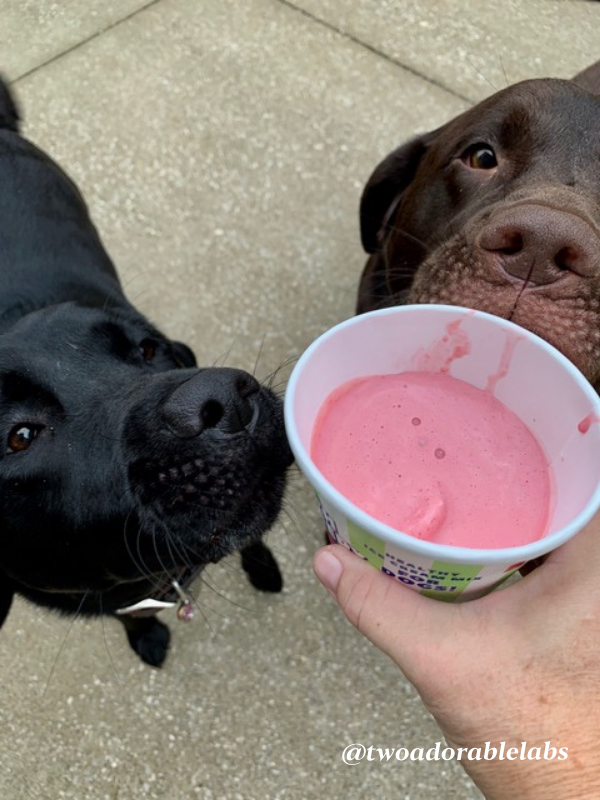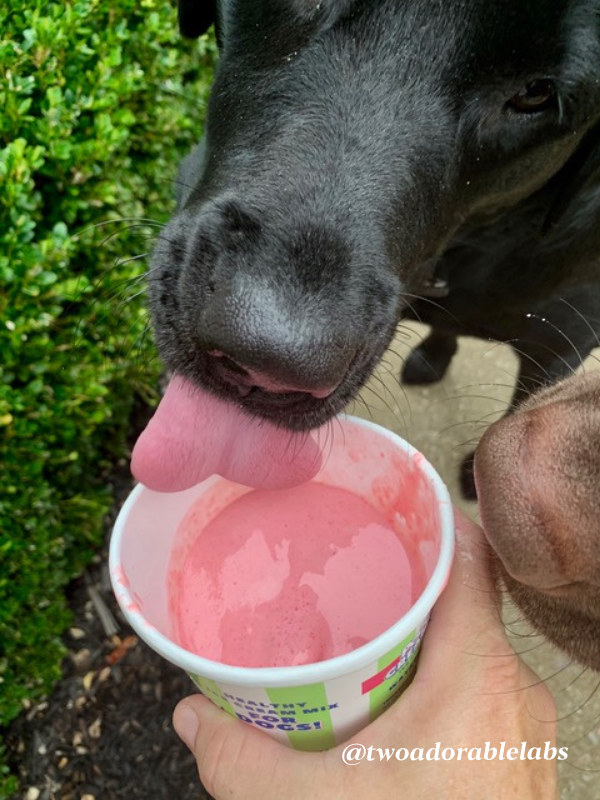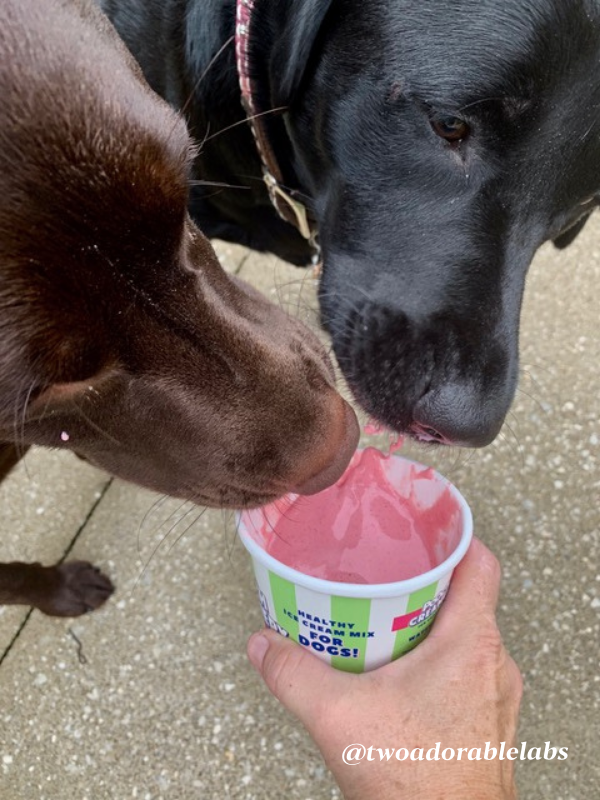Can Dogs Eat Gelatin?


Looks like Jake and Maggie are happy!
They lapped up this ice cream and had it all over their faces! I had to use a wash cloth and wipe them down after we had this little snack. :-). Well, maybe because I let it sit a bit longer than 15 minutes (I lost track of time) and it was runnier than what it needed to be. Ooops!

Can dogs eat Gelatin?
Yes! Gelatin contains amino acids beneficial for skin, hair, and joint health. The main ingredient in gelatin is collagen, a protein found in animal tissues, ligaments, tendons, bones and skin. Glycine, the main amino acid in gelatin, is said to protect against seizures and brain damage.
What are the benefits of Gelatin?
Gelatin has anti-inflammatory and brain-protective actions that are especially important during aging and when under stress. Gelatin attracts digestive juices to itself, which makes it easier for dogs to digest grains and carbohydrates. Gluten-containing grains like barley, oats and wheat frequently cause allergic reactions in many dogs. Gelatin increases a dog’s ability to utilize the proteins found in these grains. It protects the lining of the stomach, soothes upset stomachs, and helps other digestive ailments like irritable bowel syndrome and diarrhea. Disorders such as degenerative joint disease, osteoporosis, arthritis and rheumatoid arthritis respond favorably to diets containing gelatin because it reduces the inflammation. In a mature animal, gelatin can make up half of the dietary protein intake but as little as just two teaspoons a day can be beneficial for a 50 to 75 lb dog.

Can dogs have Jello?
One of the ingredients of Jello is Gelatin so giving your pup a small amount of Jello isn’t bad but isn’t great either. Jello contains large amounts of sugar and sugar is not good for your dog. The main ingredients of jello are water, gelatin, artificial flavors, sugar, and food coloring. Gelatin is the one ingredient that makes it possible for you to put it into so many different forms. Take into consideration that many suggest sugar-free jello is better but also consider it contains Xylitol.
Dogs and sugar are a big no-no. Bacteria in the mouth consume sugar to produce acids that attack tooth enamel which promotes cavities. An upset stomach is often the result of regular sugar consumption and will lead to vomiting and diarrhea. The refined sugars we have in our food are largely empty calories and shouldn’t be fed to any dog.
That doesn’t mean that you should go for the “sugar-free” alternatives which are even worse.
Xylitol Toxicity in Dogs
Often times, the “sugar-free” alternatives are not healthier. Artificial sweeteners are extremely dangerous for dogs and should be avoided at any cost.
Xylitol is an extremely strong stimulator of insulin, so tiny amounts (0.1g/kg) cause a drastic drop in blood sugar leading to seizures, coma or even death.
Keep in mind that xylitol is not often directly addressed on the product. You may find some replacement terms or euphemisms like:
• Low carb
• Tooth-friendly
• Naturally sweetened
• Reduced sugar
Xylitol can be an ingredient in gum, peanut butter, toothpaste, candy, cereal, and baked goods just to name a few. If your dog has consumed Xylitol, get them to a vet immediately.

You Might Also Like
What Are The Health Hazards Of Walking A Dog During Winter?
Happy Wednesday, everyone! What Are The Health Hazards Of Walking A Dog During Winter? Maggie loves playing in the snow, but the major snowstorm that rocked our area on Sunday made it hard for us to stay out and play as long as we normally do. We got about 14...
30 Tips And Statements On What Pup Parents Wish They Knew Before Getting A Dog
Happy Wednesday, everyone! I’ve been volunteering at the Hancock County Animal Shelter and spending time with my cousin’s dog, Jasmine (yes, she is still there). As I watch people come in, I wonder whether they are seasoned dog owners looking for another addition to...
5 Different Dog Cuddling Styles and What They Mean
Happy Wednesday, everyone! Do you have a dog who loves to snuggle, or one who gives you a minute or two of attention and then walks away? Do you think Dogs Snuggle With their Alpha? This article, based on research and from www.paradepets.com, on the 5 Different Dog...




Aww! They are coming up with such fun things to enjoy with our furry ones!!!
Yep! Jake and Maggie loved this treat…especially Jake! LOL